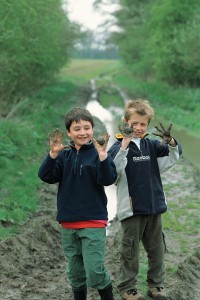New research by an organisation called Common Sense Media on 2000 young children found that 38% of children under the age of 2 have used a mobile device for playing games, watching videos or other media-related purposes. In 2011, only 10% had. Not only this but the average time that each child spends on smart mobile devices has tripled.  Common sense tells us that technology cannot be ignored, that our children need to be able to navigate it, but we mustn’t forget they need to be able to navigate the real world too.
Common sense tells us that technology cannot be ignored, that our children need to be able to navigate it, but we mustn’t forget they need to be able to navigate the real world too.
At this very young age their brains are still developing and screen based images can have a profound detrimental effect. Many other countries have recognised this and it is illegal to target games and TV programmes for under twos but not in the UK. Sadly things have got out of balance, perspectives have become skewed, so people feel they would be doing a bad parenting job if they let their kids play outside getting dirty but think it is fine to plug them in.
What is happening? Do parents really believe letting their children sit in front of these screens for so much of their waking time is educational or good for them? Are they just becoming more lazy, or could they possibly be becoming so addicted to their own mobile devices they don’t care what their children are doing? Teachers are persistently reporting an increase of language delay when children first start school. Hardly surprising when they have been so busy watching they haven’t had time to communicate with real people and learn to talk, or the real people are too busy to look up from their screens to talk to them! 
Isn’t it common sense to conclude that if our children are spending longer in front of a screen being entertained, they are obviously spending less time doing other things, like interacting with their friends and family, playing and exploring the natural world they live in? Are we forgetting the value of this free playtime, loosing perspective on what years of evolution has perfected; how we learn? We learn from interaction, free explorative play and personal experience not passive screen based entertainment. That should be left for a bit of relaxation at the end of an inquisitive day.
But never fear, there is a solution. Let your older children play on their devices but only after they have had some real life experiences. Reconnect them to the natural world by stepping outside for a little time every day. It can take a short time for them to truly get unplugged, but if you persevere, very quickly they find things to explore and have fun.
If you are worried about what to do and need a little inspiration, take one of our books with you as a starting point for some wonderful truly educational adventures. Ironically they even come in e-book format so you can take them out on those smart phones. Now there is no excuse to strike a better healthier balance, let the technology take you out!

